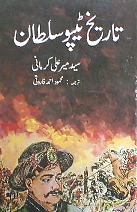
History of Tipu Sultan, the emperor of Dakan(a state of sub-continent, now in India). Tipu Sultan faught the english army at that time when every state around him fell down to english Army. He was so brave that he died but he didn't let down his state in the English Hands. The death of Tipu Sultan is the greatest incident of our history and its gave us so many lesson , the one that dont let down your self respect at any cost even not at the cost of your life. This books was written after 7 years of the murder of Tipu Sultan and is the first written about Sher-e-Dakan.
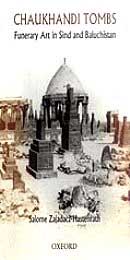
The Chaukhandi Tombs is among the largest and best-preserved necropolis in the world. Being unique in the whole Islamic world and evolving purely from local traditions, these tombs render a most original and independent contribution to Islamic sepulchral architecture and ornamental sculpture. This book contains the first systematic study and analyses of group funerary structures, comprising some fifty cemeteries of varying size, with approximately 2000 monuments. It is the first book devoted exclusively to this subject; the author’s own fieldwork and documentation having made the work authoritative. The author has used the style-critical method to delineate the particular features of Chaukhandi as well as to trace the features that link it to the architectural tradition of Gujrat and Western India.
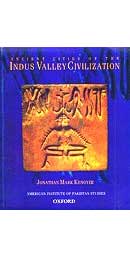
Ancient Cities of the Indus Valley CivilizationThis lavishly illustrated book presents a coherent and fascinating account of the Indus Valley civilization that will appeal to specialists and non-specialists alike. Kenoyer draws on the latest archaeological information from Harappa, Mohenjodaro, Dholavira, and other major sites as well as on his considerable knowledge of South Asian societies and ancient technologies. He addresses such enduring topics as the nature and role of the Indus writing system, the Indus religino as evidenced through sculpture and architecture, the political organization of Indus city-states, long-distance trade and the importance of merchants in Indus society, and the daily life of the diverse inhabitants of the cities, towns, and villages of the region.

This book highlights the diversity of voices, traditions, and approaches that are weaving themselves into an anti-nuclear and peace movement in India and Pakistan. In these essays, written before, during, and after the May 1998 nuclear explosions, scholars and activists from the two countries attempt to understand and challenge the nuclearization of South Asia. The essays are an act of resistance against governments that see nuclear weapons as a currency of power, as symbols of prestige, sources of security, and moments of glory in an otherwise dismal contemporary history. The collection includes Mahatma Gandhi’s response to the atomic bombing of Hiroshima as well as writings by Eqbal Ahmad, Arundhati Roy, Pervez Hoodbhoy, Beena Sarwar, Amartya Sen, and veteran anti-nuclear activists, academics, and journalists.
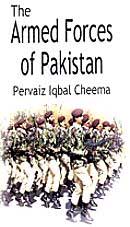
The Armed Forces of PakistanSince the creation of Pakistan in 1947, the armed forces have played a central role. This book describes the nature of Pakistan’s defence capabilities and the forces poised to change them in the twenty-first century. It surveys the forces locked in conflict over the nuclear option and examines the three types of pressures Pakistan continues to face—militarization, secularization and Islamic fundamentalism. Sharing a border with Afghanistan, where an internationally fuelled civil war has given way to a war against international terror, and India, with which Pakistan has faced three wars, Pakistan’s armed forces continue to play an important role both internally and externally. The author has assessed the role of the armed forces in the context of defense policy and strategy, and its social and political role. He also provides the most comprehensive description of all three forces, the army, navy and air force.
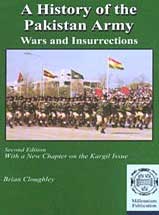
The author gives a candid, no holds barred account of the Pakistan Army. He describes its evolution, its brutal suppression of the former East Wing (now Bangladesh), the events leading to the overthrow of Prime Minister Zulfiqar Ali Bhutto in 1977, and other dramatic episodes in brisk and telling language. This new edition of the book contains a chapter which describes the dramatic resignation of the Army Chief in 1988 (giving his hitherto unpublished personal reasons), and the intrusion into Indian-administered territory in Kashmir by Pakistan-backed militants in 1999. The author makes use of the information provided by senior foreign officials as well as highly placed Indian and Pakistani sources.
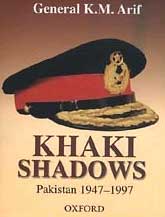
Khaki Shadows: Pakistan Army 1947 to 1997This book describes the influential role of the army in the politics of Pakistan from its earliest years till the late 1990s and analyzes how political and military forces both created and undermined national prestige. Written by a retired general, who held important positions in two different martial law administrations, it provides an insider's account of the intrigues, manipulations, and power struggles that have engulfed Pakistan throughout its history
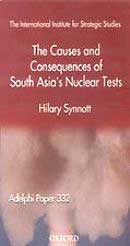
Causes and Consequences of South Asia-s Nuclear TestsFrom an account of the trials and tribulations of the young recruit to the observations of a mature aviator, Air Commodore Mansoor Shah has much to offer in these reminiscences of life in the nascent Royal Indian and Pakistan Air Forces. He is able to shed light on the development of the PAF as well as on the Pakistan Army and Navy from a favourable vantage point, thanks to the wide range of this assignments. The value of this book is enhanced by the fact that there are not many other accounts of the RIAF and the early PAF by South Asians who served in both organizations, and the number of individuals who were capable of creating such a record has been pruned by time. The wealth of detail the author offers in this book promises to keep both airmen and general readers enthralled.
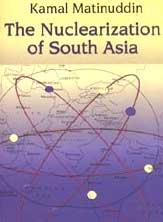
This book traces the nuclear and missile programs of both Pakistan & India from their inception to their present status. It discusses India’s decision to flaunt its nuclear capability, and Pakistan’s decision to follow suit. It also presents an analysis of India’s nuclear doctrines, and suggests ways by which Pakistan can keep the size of its nuclear program to a minimum. Moreover, the author emphasizes the need for both Pakistan and India to take measures to prevent a nuclear and missiles arms race, and to guard against an accidental nuclear exchange.
Flowersentiments.com is the only online gift shop in Pakistan offering 100% refund to every customer in case of any major/minor complain. No questions asked. FRESHNESS of Flowers, Cakes, Sweets and Fruits is guranteed.Send Flowers to Pakistan, Cakes to Pakistan or any other Gift to Pakistan today !
Same day delivery available in Lahore, Karachi, Peshawar, Quetta, Islamabad, Rawalpindi, Multan and Faisalabad. Fixed time delivery is available in Lahore, Karachi and Islamabad only *. (Extra Charges Apply)
No need to wait now, We are 24/7 available. If you don't find us online here.. Just drop us an email and we will get back to you in less than an hour...keep clock ticking...Need to send flowers, cakes or fruits in Pakistan... Give us a try today !
copyright of flowersentiments.com 2005-2025 A Gifts & Sentiments Delivery Service in Pakistan
Designed and Developed by NadirSoft